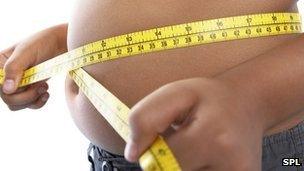Childhood obesity 'can be predicted by check at birth'
- Published

Researchers say a baby's chance of being obese in childhood can be predicted at birth using a simple formula.
The formula, external combines several known factors to estimate the risk of obesity.
The authors of the study, published in PLos One, external, hope it will be used to identify babies at risk.
Childhood obesity can lead to many health problems, including Type 2 diabetes and heart disease.
Researchers from Imperial College London looked at 4,032 Finnish children born in 1986 and at data from two further studies of 1,503 Italian children and 1,032 US children.
They found that looking at a few simple measurements, such as a child's birthweight and whether the mother smoked, was enough to predict obesity.
Previously it had been thought that genetic factors would give bigger clues to later weight problems, but only about one in 10 cases of obesity is the result of a rare gene mutation that affects appetite.
Obesity in children is rising, with the NHS estimating that 17% of boys and 15% of girls in England are now obese.
The risk factors for obesity are already well known, but this is the first time these factors have been put together in a formula.
Prof Philippe Froguel from Imperial College London, who led the study, said that prevention was the best strategy. Once obese, a child can find it difficult to lose weight.
"The equation is based on data everyone can obtain from a newborn, and we found it can predict around 80% of obese children.
"Unfortunately, public prevention campaigns have been rather ineffective at preventing obesity in school-age children. Teaching parents about the dangers of overfeeding and bad nutritional habits at a young age would be much more effective.
"The message is simple. All at-risk children should be identified, monitored and given good advice, but this costs money."
Prof Paul Gately, a specialist in childhood obesity at Leeds Metropolitan University, said a tool like this would help the NHS target specific people at risk rather than the "scattergun one-size-fits-all approach, which we know does not work".
"Rather than spending money on a huge number of people, we can be more specific and spend appropriately. We may not save money in the short-term but it will be spent more wisely and could reduce [obesity-related] NHS bills in the future.
"We've done a great job of outlining that obesity is a serious issue but we have made the general public paranoid that everyone is at risk.
"Tools like this will help change that attitude. Once we use the tool, we need intervention programmes for children at a greater risk."
- Published26 September 2012
- Published24 July 2012
- Published24 May 2012